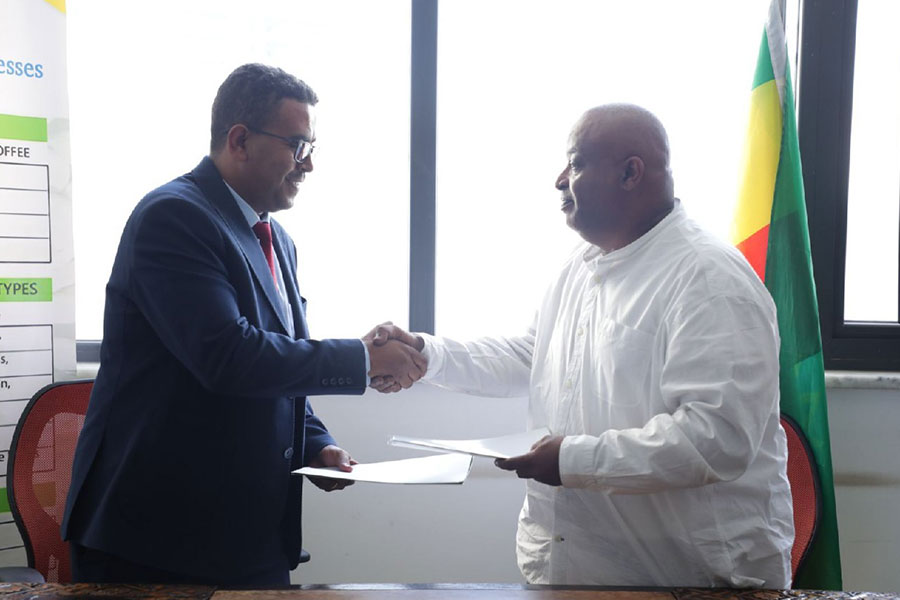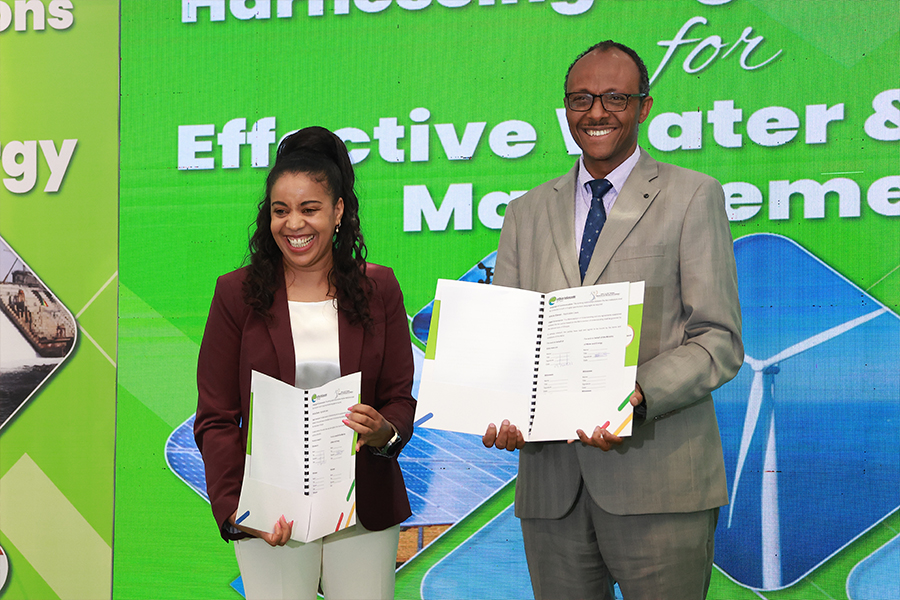
Commentaries | Sep 11,2020
Jun 20 , 2020.
The messages from Washington, DC are unambiguous. They urge Ethiopia to relent to Egypt's demand for a deal before it starts filling the Grand Ethiopian Renaissance Dam (GERD) next month. Glossed over in these messages are threats implying that Ethiopia could face an uncertain future in its relations with the United States and the multilateral financial institutions where it holds significant power.
Ethiopia, Egypt and, to a degree, Sudan are in a diplomatic impasse over disagreements about the filling and operation of the Dam. It is often the case that contradictory statements come from the parties involved in the talks. It was no different following their latest talks last week, during a video conference held on June 17, 2020.
It was part of an ongoing negotiation to set rules and guidelines on the first filling, scheduled to begin in July of this year, and the annual operation of the Dam and the impact this could have in the downstream countries. Negotiators from Ethiopia, and Sudan too, claim that many of the technical issues have been hammered out. Still, a legally-binding deal, which would include a mechanism for the settling of disputes between the three countries, is yet to be made.
Ethiopia’s Ministery of Water, Irrigation & Energy, believes that “negotiation requires prudence to safeguard the permanent right of Ethiopia over the Blue Nile.” This is while the Sudanese delegates said they needed “guidance" from their Prime Minister on the resolution of the legal issues.
For Egypt, these statements show nothing but "Ethiopia's intransigence."
In the meantime, the clock is ticking. And so is the desperation of Egypt's leaders in the face of Ethiopia's determination to begin filling the Dam in a few weeks. It is a decision that makes not only Cairo and Khartoum displeased. Washington, DC keeps weighing in to the constant irritation of Addis Abeba.
An unusual statement was issued over Twitter by the United States' National Security Council demanding Ethiopia make a deal before it begins to catch water for the GERD. Just as ominous was the subtle remarks from the World Bank's chief, David Malpass, who also served as the undersecretary of the US Treasury for international affairs under President Donald Trump. It is no secret that the World Bank has always been under the weighty influence of its most significant contributor and most powerful voter, the United States; but rarely does it coordinate messaging on such a regional issue.
It was only shocking to Addis Abeba to see the World Bank's President take the trouble to emphasise during his call with Prime Minister Abiy Ahmed that "Ethiopia and its neighbours sustain constructive dialogue [and] cooperation on water sharing."
It is hard not to read this as a thinly veiled threat.
The response was symbolic of a growing polarisation over the GERD between Ethiopia and Egypt. For the former, even its high officials minced no words. Abebe Abebayehu, head of the Ethiopian Investment Commission (EIC), responded to the Security Council's comment saying, “It isn’t anyone’s damn business.”
The level of agreement across the political aisles when it comes to the GERD is similarly unprecedented compared to almost every other national issue. Even some of the Prime Minister's determined detractors seem to be on the same page. If there is an issue Jawar Mohammed and Eskinder Nega could see eye to eye on, it is in their respective responses to the remarks from Washington, DC.
There has always been an overriding consensus in Ethiopia that no country has a right to dictate terms for a project that lies safely within its sovereign borders and the right to make use of its national resources.
On this, Ethiopia’s conviction is backed up by international rules that guide relationships between countries. For all of its remonstrations, Egypt has not invoked an international treaty that would prevent the completion of the hydroelectric dam. All it has to go on are colonial-era treaties that give it historical (read: hegemonic) rights over a river it neither is the source of nor consulted the country from which about four-fifths of the waters originate.
For decades, Egypt’s superior negotiating tactics have left Ethiopia on the defensive and framed the argument in such a way that the latter was the victim. Despite the absence of credible evidence, it has successfully painted Ethiopia as an aggressor attempting to severely curtail the supply of water to around 100 million of its inhabitants with an over-ambitious rapid filling schedule.
Its success has come in with its ability to play on the connection the international community has made between the Nile and the Egyptian culture and civilisation. It is a “fabled river at the heart of Egypt’s very identity,” as The New York Timesput it in a piece about the dispute over the Dam.
It is a view held in Egypt as much as outside of it. And it is a misrepresentation of facts that has helped Egypt stick with its outdated water security strategy, unwisely anchored on the Nile River. Hence, the answer to the disputes lies in its revision for broader cooperation with the 11 countries in the Nile Basin, having a combined population of over half a billion people.
Egypt may see the Nile as central to its history. It is a nation that prides itself in developing one of the oldest civilisations, tracing its roots to the farmers that settled around the floodplains of Egypt several millennia ago. It is an understandable self-image and appreciated too.
There is also another side to it. It is a country that experiences the highest level of inefficiency in water usage. Ironically, one of the most water-scarce countries in the world happens to be a net exporter of what experts call "virtual water." No less than 10pc of water it receives from the Nile is sent out virtually through its exports of corn, a crop known to have taken double the volume of water in Egypt than in Europe. Yet Egypt could choose to conserve this water on other crucial needs and import maize from where it can be found cheaper.
Nonetheless, this is also about its leaders' choices in anchoring their water security strategy over a source with fluctuating volume year to year, instead of tapping into the groundwater in the Nubian desert, which reservoir researchers estimate can represent a 500-year equivalent of waters from the Nile.
Egyptian leaders' unwillingness to revise their water security strategy has put its negotiators in a position superbly described by Foreign Minister Gedu Andargachew, as people who "want to take but not give." This could be because they are participating in the talks not due to a rational desire to compromise. They appear to be participating in the negotiations with the primary intention of arm-twisting Ethiopia into at least delaying the filling of the Dam.
The same goes for Ethiopia's negotiators, who have no intention of conceding on the central part of the contention - when it is to be filled. Under overwhelming public pressure not to give in, they seem to be participating to show goodwill and placate a regional power with far more resources and influences on the international stage.
But while it is evident that no significant compromises are to be made by either country, it is Egypt that seems to have adequately understood this. It is expending its efforts to make its point on the international stage, despite the fact that the curve of history bends against its claims. Its go-to has been the United States, a country with an administration in the White House bent on buying Egypt's silence, if not support, in its Israeli-centered Middle Eastern re-engineering. Egypt knows it cannot convince Ethiopia, but it is trying to persuade everyone else. It knows it cannot win the legal argument so it is thus attempting to superimpose a narrative that fits its perspective.
It is a tactic missing on Ethiopia’s side. Its diplomats need to win not just the diplomatic war but the narrative as well.
The history behind Egypt's hegemony over the use of the Nile waters and its privileged position in shaping the global agenda can be successfully thwarted if Ethiopia takes the debate to Egypt's water security strategy. It is indeed unfair, unsustainable and promotes unjust water-sharing arrangements within the Nile Basin. Egypt and, partly, Sudan are beneficiaries of a past they both should have rejected. It is the hypocrisy of the highest rank to have thrown out the yoke of colonialism only to keep remnants of it that continue to be beneficial.
It is seen, rightly, as an injustice faced by all the other countries of the Nile Basin. It is in solidarity with them, not unilaterally, that Ethiopia has the chance to make its cause heard over the Nile dispute.
PUBLISHED ON
Jun 20,2020 [ VOL
21 , NO
1051]

Commentaries | Sep 11,2020

Radar | Apr 13,2025

Viewpoints | Jun 26,2021

Radar | Feb 09,2019

Fortune News | Nov 21,2018

Radar | Nov 11,2023

Commentaries | Jul 18,2020

Fortune News | Nov 13,2021

Sponsored Contents | Mar 03,2022

News Analysis | Jun 15,2024

Photo Gallery | 180670 Views | May 06,2019

Photo Gallery | 170864 Views | Apr 26,2019

Photo Gallery | 161950 Views | Oct 06,2021

My Opinion | 137303 Views | Aug 14,2021

Dec 22 , 2024 . By TIZITA SHEWAFERAW
Charged with transforming colossal state-owned enterprises into modern and competitiv...

Aug 18 , 2024 . By AKSAH ITALO
Although predictable Yonas Zerihun's job in the ride-hailing service is not immune to...

Jul 28 , 2024 . By TIZITA SHEWAFERAW
Unhabitual, perhaps too many, Samuel Gebreyohannes, 38, used to occasionally enjoy a couple of beers at breakfast. However, he recently swit...

Jul 13 , 2024 . By AKSAH ITALO
Investors who rely on tractors, trucks, and field vehicles for commuting, transporting commodities, and f...

Nov 2 , 2025
The National Bank of Ethiopia (NBE) has scrapped the credit-growth ceiling that had s...

Nov 2 , 2025 . By SURAFEL MULUGETA
The burgeoning data mining industry is struggling with mounting concerns following th...

Nov 2 , 2025 . By YITBAREK GETACHEW
Berhan Bank has chosen a different route in its pursuit of a new headquarters, opting for a transitional building instea...

Nov 2 , 2025 . By BEZAWIT HULUAGER
Nib International Bank S.C. has found itself at the epicentre of a severe governance...